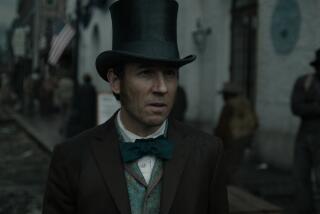Making sure âMad Menâ is â60s authentic

A warning to amateur history buffs out there: Kathryn Allison Mann has a job that might just make you blind with envy.
As head of research on âMad Men,â which winds down its sixth season June 23 on AMC, Mann is responsible for upholding the period dramaâs well-earned reputation for authenticity and for mining the tumultuous history of the 1960s for potential fodder for series creator Matthew Weiner and his writing team.
âItâs relentlessly interesting,â says Mann, 29, who studied English and philosophy at Bates College in Maine and started on âMad Menâ as a production assistant before stepping into her current position in Season 4.
PHOTOS: The women of âMad Menâ
Mann is typically one of the first staff members to return at the start of a new âMad Menâ season. Once Weiner tells her when the series will resume chronologically, she compiles a detailed timeline of noteworthy events in news, politics and culture â anything that might provide creative inspiration for the writing staff.
Assisted by a handful of interns, Mann begins by methodically combing the front page of the New York Times each day of the year being depicted. Back issues of Life, the New Yorker, New York Magazine and smaller regional newspapers are other rich fonts of material. This being âMad Men,â Mann also charts key developments in advertising, culled from the archives of Ad Age and other trade publications.
Of course, books come in handy too. Mannâs wide-ranging reference list includes titles such as Rick Perlsteinâs âNixonland: The Rise of a President and the Fracturing of America,â Vincent J. Cannatoâs âThe Ungovernable City: John Lindsay and His Struggle to Save New Yorkâ and Stephen Foxâs âThe Mirror Makers: A History of American Advertising and Its Creators.â
Mann had her work cut out for her preparing for this season, set in 1968, one of the most convulsive and exhaustively chronicled chapters in American history. âYou forget that year not only were Bobby Kennedy and Martin Luther King assassinated, but New York was also moving closer to the â70s and the bedlam of all of that,â she says.
As soon as the timeline is complete â the process can take up to a month â Mann presents it to the writers, ideally a few days before they return to work.
PHOTOS: On the set of âMad Menâ
While theyâre free to disregard or use whatever they like, at least one event included in Mannâs calendar made it into Season 6: In âThe Flood,â the news of Kingâs assassination spreads during a glitzy industry banquet. âWe found that the Andy Awards were interrupted in the exact way that ended up on the show,â she says.
Throughout the actual writing process, Weiner and team will ask Mann for help realizing their ideas in a factually accurate way. A recent subplot involving Mitchell, the teenage son of Don Draperâs mistress, is a prime example. âMatt called me and said, âI need you to find out how he could become reclassified as 1-A,ââ Mann recalls.
She was able to track down a draft expert, Michael Foley, author of âConfronting the War Machine: Draft Resistance During the Vietnam War.â He suggested that Mitchell could have been reclassified if he had returned his draft card in protest, as happened in the episode âFavors.â
Mann frequently calls upon academics and historians but leans just as heavily on industry veterans, real-life Don Drapers and Peggy Olsons who can speak to the culture of 1960s Madison Avenue. âI talk to them about relationships, how people might interact with a certain company at a client meeting,â Mann says. âI also ask really simple questions, like âWhere did you eat lunch?ââ
Given the intense secrecy surrounding âMad Men,â Mann usually doesnât reveal where sheâs calling from, at least not at first, saying only that sheâs âdoing historical research for a fictional story.â
âItâs not a lie,â she adds apologetically.
PHOTOS: How to survive life without âMad Menâ
Finally, Mann reviews each and every completed script to ensure that all language is period-appropriate. Any suspect words or phrases are checked against the Oxford English Dictionary, slang reference books and printed material from the era.
The system works well enough that the anachronisms are both rare and minor. Nevertheless, âMad Menâsâ famously nitpicky audience delights in pointing them out. Mann claims sheâs not bothered by the scrutiny. âI donât really pay attention to it. Every time I do read something, I roll my eyes, because Iâve looked it up and theyâre usually wrong.â
She also enjoys outwitting the showâs obsessive followers. Case in point: Bloggers struggled in vain to determine whether a provocative âTonight Showâ routine alluded to in the season premiere, âThe Doorway,â had in fact taken place. (It hadnât.)
âIt was satisfying for me to watch all these reporters try to find out whether it had really aired,â says Mann, âbecause itâs something that I do on a daily basis.â
More to Read
The complete guide to home viewing
Get Screen Gab for everything about the TV shows and streaming movies everyoneâs talking about.
You may occasionally receive promotional content from the Los Angeles Times.






